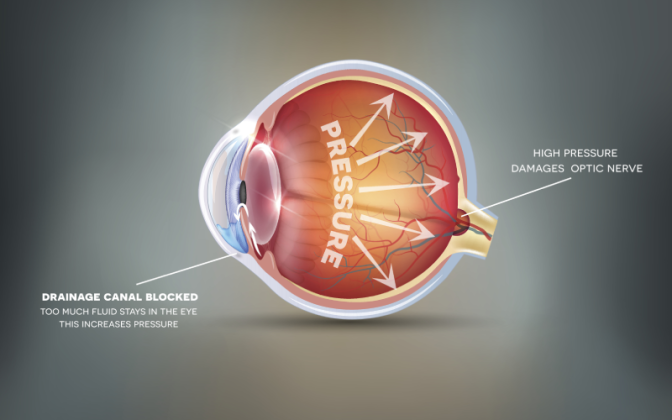Buy one pair of eyeglasses, get a second pair 50% off!
*Restrictions apply. Click here for details.
Glaucoma Doctors with Nationwide Optometry

Glaucoma is the leading cause of irreversible blindness in the world. It is a group of eye conditions that is commonly referred to as “the silent thief of sight” because the symptoms develop slowly and often go unnoticed. Many patients suffering from glaucoma lose up to 40 percent loss in vision before realizing there is a problem.
Routine eye exams allow the team at Nationwide Vision to detect eye disease and conditions before vision loss or impairment occurs. Although glaucoma cannot be prevented, it can be controlled. Our doctors specialize in glaucoma care and will help you maintain your best vision possible.
Schedule A Glaucoma Exam at Nationwide Vision Today

Protect your gift of sight and request an appointment with one of our glaucoma specialists today.
What Is Glaucoma?
Glaucoma most often affects people over 40 years old. It occurs when your eye cannot maintain a balance between the amount of intraocular fluid produced and drained. Intraocular fluid maintains the shape of your eye and flows between the iris and the lens. When there is an imbalance, the pressure in your eye increases. Too much pressure causes damage to the optic nerve, which is the part of the eye that is responsible for sending the images you see to the brain. Damage to the optic nerve cannot be reversed. Over time, and if left untreated, glaucoma impacts your ability to see completely and clearly.
Risk Factors for Glaucoma
Glaucoma can be hereditary and affect people of all ages, including infants, children, and young adults. It can cause throbbing headaches, extreme eye pressure, redness of the eye, and reduced peripheral vision. Telling your doctor if you have a family history of glaucoma or are at risk for the disease can play an integral role in protecting your eyes and preventing discomfort. In addition to age, risk factors for glaucoma include:
African American, Irish, Russian, Japanese, Hispanic, Inuit, or Scandinavian background
Diabetes
Heart disease
Sickle cell anemia
Hypertension
High blood pressure
High eye pressure
Steroids including hydrocortisone and prednisone
Medications for bladder control and seizures
Some over-the-counter cold remedies
Previous eye injury
Family history of glaucoma
Nearsightedness or farsightedness
Thin corneas
If you have a family history of glaucoma, are at risk of developing the disease, or experiencing any of the symptoms, call (phone number) to schedule an appointment with Nationwide Vision today.
How is Glaucoma Detected?
A comprehensive eye exam is the best way to detect glaucoma and at Nationwide Vision, we use the most advanced technology available. In addition to considering any risk factors, your eye doctor will dilate your pupils, inspect the inside of your eye, and perform additional tests if necessary. Tests for glaucoma include:
Visual field test to evaluate your peripheral vision
Fundus photos to monitor the retina and optic nerve
Gonioscopy to evaluate the flow of intraocular fluid
Pachymetry to measure the thickness of the cornea
Tonometry to measure the intraocular eye pressure
OCT (ocular coherence tomography) to monitor structural changes to the optic nerve
Not all of these tests may be necessary but can be used together to diagnose or rule out glaucoma. Your eye doctor will analyze the results and may consult an ophthalmologist to determine the best course of treatment for your unique eyes.
Schedule a Glaucoma Exam at Nationwide Vision Today

Early detection of glaucoma is key because symptoms often go unnoticed and once vision loss occurs, it cannot be restored. If you are at risk for glaucoma, you should see your eye doctor more regularly. Schedule an appointment with Nationwide Vision today.
Frequently Asked Questions About Glaucoma
Glaucoma cannot be prevented or cured and damage to the optic nerve cannot be reversed. Of about 2.3 million cases each year, approximately 120,000 have resulted in blindness. It is important to see your eye doctor regularly so that they can detect and diagnose glaucoma as soon as possible to prevent vision loss and preserve your sight.
The team of doctors with Nationwide Optometry specializes in identifying, diagnosing, and treating eye conditions and diseases. If you are diagnosed with glaucoma, we will help you determine whether medication or surgery is the best treatment option for you based on your eye health, lifestyle, and glaucoma condition.
Did you know changes to your vision can occur without you noticing? There are generally no warning signs or obvious symptoms in the early stages of glaucoma. However, as the disease progresses, you may experience:
Blind spots in your peripheral vision
Blurred vision
Extreme eye pressure
Redness of the eye
Seeing glare or halos
Throbbing headaches
Difficulty with tasks that require visual attention, like reading and driving
Nausea
Vomiting
If you are experiencing any symptoms of glaucoma, click here to schedule an exam with one of the specialists with Nationwide Optometry today.
At Nationwide Vision, we recommend routine, comprehensive eye exams for the whole family to ensure you are experiencing the best vision possible at every stage of life.
Your eye doctor may recommend yearly exams if you’re over 40 years of age or have any of the traits that put you at a higher risk for glaucoma.
